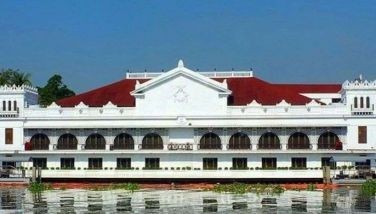Bizarre

This is such a bizarre situation we have on the Korean peninsula.
Pyongyang is threatening to fire missiles at unspecified targets — and yet no one wants to believe they will. The North Koreans are trying to scare everybody with shrill propaganda while the South Koreans are wandering about in the shopping malls.
Although everyone might seem completely unimpressed by Pyongyang’s bluster, the North Koreans are known to take reckless actions. Once they boarded and captured an American warship, which they preserve to this day as some rusty trophy. More recently, they sunk a South Korean patrol boat and bombarded an inhabited island, killing a few South Korean citizens.
With Russia and China standing staunchly behind them, the North Koreans think they can be provocative and get away with it. In the past, they threw tantrums and forced the rest of the world to negotiate. In the name of confidence-building measures that might draw the North into productive engagement, Pyongyang received food aid and even a joint economic zone where industries from the South employed their northern brothers.
A few years ago, when the North was gripped by famine, Pyongyang made a show of blowing up the cooling tower of their nuclear plant in order to acquire food aid. Last week, Kim Jong-un announced that same nuclear plant (which violates international conventions) will be rebuilt.
The global configuration, however, has changed to Pyongyang’s disadvantage. When the North test-fired missiles, the UN Security Council penalized the country with economic sanctions. Neither Beijing nor Moscow bothered to block that resolution. That should have sent a strong signal that Kim Jong-un might have missed.
The latest round of escalating bluster was provoked precisely by that UN resolution. Without closely studying the changing attitudes of their erstwhile allies, Pyongyang launched into a mad tantrum, threatening everybody else with nuclear annihilation.
Over the past couple of weeks, as Pyongyang ranted and threatened to break the peace, both Beijing and Moscow maintained a stony silence. Neither capital made any gesture of support for their erratic ally. The diplomatic silence is deafening.
Both China and Russia, it is now obvious, have grown weary of their poverty-stricken and yet dangerously over-armed ally. Pyongyang succeeded only in abusing the friendship of the very few countries still considering her a friend.
Today, some analysts are saying that the bizarre noises coming out of Pyongyang pushed China and the US more closely together. Both major powers now share the conviction that the hermit kingdom, ruled by a dysfunctional dynasty, is now nothing more than a destabilizing pest.
Should Kim Jong-un persist in doing the funny things he has been doing for weeks now, he will find himself isolated from the last of his friends. Either he dials down his rhetoric and accept humiliation or he will court more overt rejection from Beijing and Moscow. Whichever happens, the young leader will undermine his own position massively.
Kosovo
Everything in this administration grinds at an exceedingly slow pace, it seems. Across the board, from reformulating mining policy to farming out PPP contracts to attending to our diplomatic responsibilities, nothing moves with any sense of urgency.
Take the matter of extending diplomatic recognition to the newfound Republic of Kosovo, for example. To date, at least 98 countries (plus the IMF and the WB) have formally recognized Kosovo. Manila has yet to do so, despite pleas from the Kosovars and, according to the grapevine, an appeal from a ranking US official in town lately.
Since Kosovo transitioned in 2001 from being a UN-administered area to a full-fledged republic, the country has been holding regular elections. The Kosovars are well on the way to consolidating a functioning democracy. They need international support to win a seat in the UN, having formally declared their independence from Serbia.
We have every reason to officially recognize the Republic of Kosovo. We have promoted ourselves as a beacon of democracy in our region. Every society aspiring to become a democracy should deserve our support.
There is much either side will gain if we open diplomatic relations and facilitate trade between our two countries. We have complementary economies and many possibilities to be markets for each other’s produce.
Recall that when the Edsa Revolution happened and a transfer of power ensued, countries like France officially recognized the new government just hours after Corazon Aquino was officially sworn into office. Such prompt diplomatic support helped the new government establish itself in the community of nations and win global support for our most immediate needs.
The delay in our extending recognition to the Republic of Kosovo, it appears, is some small-minded apprehension from people with severely limited worldviews. Because Kosovo seceded from Serbia, there is apprehension among some in our foreign policy establishment that recognizing this new nation might encourage secessionist movements here at home.
If this sort of thinking becomes pervasive in our foreign policy establishment, we might as well sever our diplomatic relations with the US for having seceded from the British Empire. Of, for that matter, sever our relations with Singapore for walking away from the Malaysian Federation.
The delay in formally recognizing Kosovo (on the consideration it might abet domestic secessionists) has become an embarrassment. It signal that the most small-minded of our bureaucrats could hold our foreign policy hostage.
Recognize Kosovo now — if not for anything else but the fact that this is a responsible thing for a democratic nation to do.
- Latest
- Trending




























